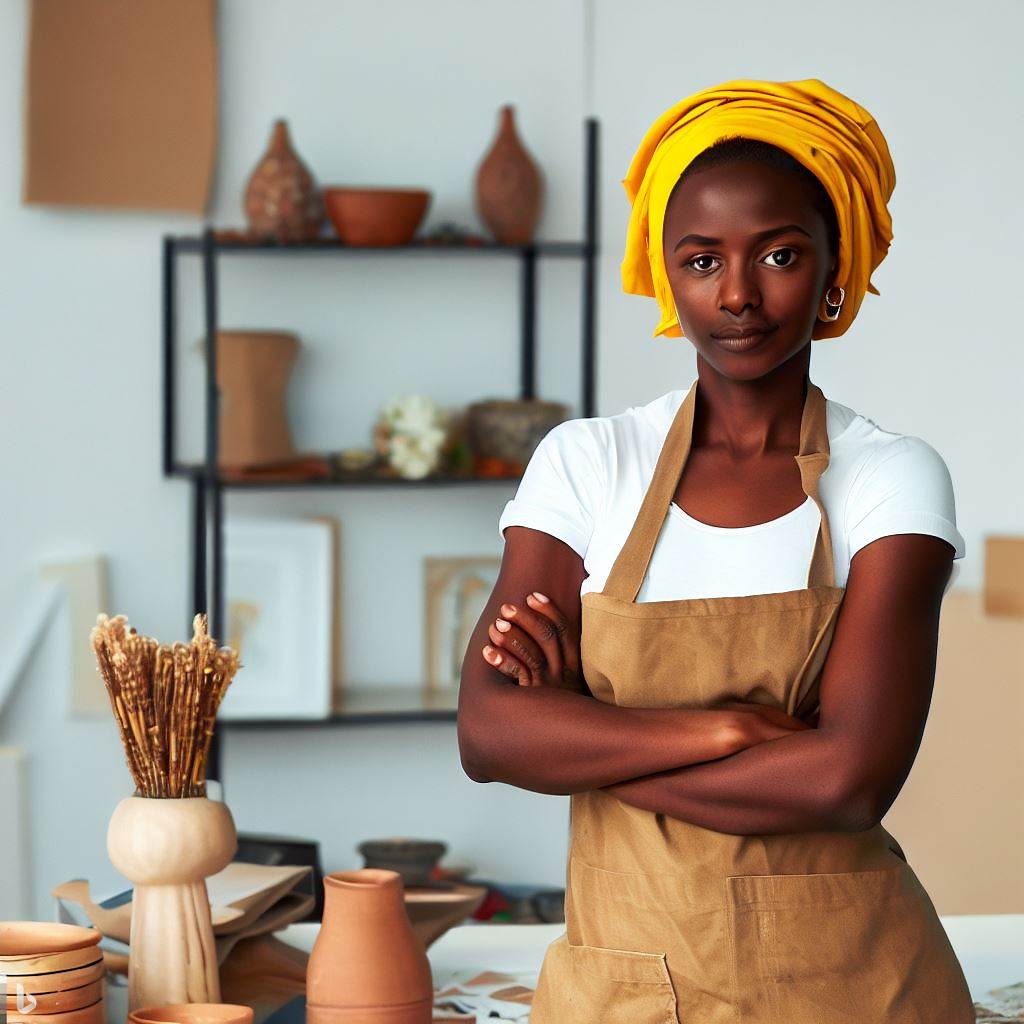Introduction
An interior decorator is a professional who transforms the interiors of a space using design techniques. Interior decoration plays a crucial role in Nigeria, as it enhances aesthetics and functionality.
This guide provides a comprehensive overview of becoming an interior decorator in Nigeria.
Interior decoration involves designing and organizing spaces to create visually appealing and functional environments.
In Nigeria, it is highly valued, as people are increasingly recognizing the importance of well-designed spaces. From homes to offices, interior decorators are in high demand.
This guide aims to assist aspiring interior decorators in Nigeria by providing a step-by-step roadmap to success.
It covers various aspects such as education and training, skills required, and potential career opportunities. Additionally, it provides insights into the current trends and challenges in the industry.
By following this guide, individuals can gain a solid foundation in interior decoration and develop the necessary skills to excel in the field.
It also highlights the significance of networking and staying updated with the latest design practices.
Whether you are a creative individual with a passion for design or looking to pursue a rewarding career, this guide is your go-to resource for becoming an interior decorator in Nigeria.
Get ready to unleash your creativity and transform spaces into beautiful and functional areas.
The Role of an Interior Decorator
When it comes to creating stylish and functional spaces, interior decorators play a crucial role.
They have a range of responsibilities and require certain skills to excel in their field.
Here is everything you need to know about the role of an interior decorator:
Responsibilities and Skills Required
- Understanding Clients’ Needs: An interior decorator must have excellent communication skills to understand clients’ preferences and design requirements.
- Creating Design Concepts: They are responsible for creating design concepts that align with the clients’ vision and budget.
- Space Planning: Interior decorators need to have a knack for efficient space planning to optimize functionality and flow.
- Material Selection: They must have a good eye for quality materials and finishes to recommend the best options to clients.
- Color Coordination: Interior decorators have a keen sense of color and can select palettes that enhance the aesthetics of a space.
- Furniture and Accessories: They source and select furniture, fixtures, and accessories that complement the design style.
- Project Management: Interior decorators coordinate with contractors and craftsmen to ensure smooth project execution.
- Budgeting: They must have knowledge of pricing, sourcing, and budgeting to stay within the clients’ financial constraints.
- Client Presentations: Interior decorators create compelling presentations to showcase design proposals to clients.
- Keeping Up with Trends: Staying updated with the latest trends and industry innovations is crucial for an interior decorator.
Difference between Interior Decorator and Interior Designer
While interior decorators and interior designers share some similarities, they have distinct roles and responsibilities:
- Focus: Interior decorators primarily focus on aesthetics and improving the visual appeal of a space.
- Educational Requirements: Interior decorators usually have a certification or diploma in interior decorating.
- Scope of Work: They specialize in selecting colors, materials, furniture, and accessories to enhance a space’s look.
- Interior Designers: In contrast, interior designers have a broader scope and are involved in space planning, structural changes, and building codes.
- Educational Requirements: Interior designers typically have a bachelor’s degree in interior design or architecture.
- Focus: Interior designers consider both the aesthetic and functional aspects of a space.
- Scope of Work: They can create floor plans, design lighting systems, and work closely with architects and contractors.
- Professional Associations: Interior designers often join professional organizations like the American Society of Interior Designers (ASID).
- Code Compliance: They must have a thorough understanding of building codes and regulations.
Whether you choose to become an interior decorator or an interior designer, both career paths offer exciting opportunities to showcase your creativity and design skills.
By understanding the distinctions and honing the necessary skills, you can excel in the world of interior design in Nigeria.
Read: Top Interior Decorator Schools in Nigeria: Where to Study?
Steps to Becoming an Interior Decorator
Education and Training
- Explore available courses and programs in Nigeria to gain a strong foundation in interior decoration.
- Obtaining a degree or certification is crucial in developing expertise and credibility in the industry.
Building a Portfolio
- A portfolio is essential for showcasing your skills and creativity to potential clients and employers.
- Create a strong portfolio by including a diverse range of projects that highlight your abilities.
Gaining Practical Experience
- Participate in internships and apprenticeships to gain hands-on experience in the field.
- Join professional organizations and attend networking events to expand your connections and knowledge.
Starting Your Interior Decoration Business
Defining Your Niche
- Identify your preferred style and clientele to establish a unique selling proposition.
- Research the market demand for interior decoration services in Nigeria to understand potential opportunities.
Creating a Business Plan
- A well-defined business plan is crucial for the success of your interior decoration business in Nigeria.
- Key components to include in your business plan are market analysis, target audience, services offered, and financial projections.
Registering Your Business
- Familiarize yourself with the legal requirements for registering a business in Nigeria and ensure compliance.
- Obtaining the necessary licenses and permits is essential to operate your interior decoration business smoothly.
Marketing and Branding
- Develop a strong brand identity that reflects your unique style and values as an interior decorator.
- Implement effective marketing strategies tailored to the Nigerian market to attract clients and promote your services.
Read: How to Get Certified as an Interior Decorator in Nigeria

You Might Also Like: Costume Design: Nigeria’s Soft Power in African Fashion
Tips for Success
Building Strong Relationships with Clients
- Good communication and listening skills are crucial for understanding clients’ needs.
- Providing tailored design solutions that meet clients’ specific requirements is essential.
Staying Up-to-Date with Trends and Industry Changes
- Continuous learning and professional development are necessary to stay relevant in the industry.
- Leveraging technology and digital platforms can provide inspiration and keep decorators informed about new trends.
Maintaining a Solid Online Presence
- Having a website and strong social media presence is important for attracting potential clients.
- Online platforms allow decorators to showcase their work and reach a wider audience.
Read: Salary Expectations for Interior Decorators in Nigeria
Discover More: The Growth of Digital Art: Graphic Design in Nigeria’s Culture
Challenges and Opportunities in the Nigerian Interior Decoration Industry
The Nigerian interior decoration industry presents both challenges and opportunities for aspiring interior decorators.
To succeed in this competitive field, decorators need to employ strategies that help them stand out and collaborate effectively with complementary professionals.
Dealing with Competition
- Strategies to stand out in a saturated market
- Collaborating with complementary professionals
Tapping into the growing real estate industry
- Opportunities in residential and commercial projects
- Building relationships with real estate developers and contractors
Overcoming Cultural and Budgetary Constraints
- Adapting to cultural preferences and traditions
- Providing cost-effective solutions without compromising quality
Dealing with Competition
In dealing with competition, interior decorators must develop unique selling points and differentiate themselves from others in the market.
This could be achieved through the use of innovative designs, providing exceptional customer service, or offering specialized services tailored to specific client needs.
By establishing a distinct brand identity, decorators can attract clients who appreciate their unique approach.
Collaboration with complementary professionals such as architects, builders, and contractors is also essential.
By partnering with these experts, decorators can expand their network, gain valuable referrals, and access a wider range of projects.
This collaboration allows for a seamless integration of different design elements, resulting in cohesive and well-executed interior spaces.
Tapping into the growing real estate industry
Tapping into the growing real estate industry is another avenue for interior decorators to explore.
With the increasing demand for housing and commercial spaces in Nigeria, there are ample opportunities for decorators to be involved in residential and commercial projects.
By establishing relationships with real estate developers and contractors, decorators can secure contracts and showcase their expertise in transforming spaces to attract potential buyers or tenants.
Overcoming Cultural and Budgetary Constraints
However, interior decorators also face cultural and budgetary constraints that must be overcome.
Nigeria is a diverse country with various cultural preferences and traditions.
Decorators need to adapt their designs to cater to these diverse cultural backgrounds while still maintaining their own unique style.
This might involve incorporating cultural elements and motifs into their designs to create spaces that resonate with the target audience.
Additionally, clients in Nigeria often have budgetary constraints when it comes to interior decoration.
Decorators must find ways to provide cost-effective solutions without compromising on quality.
This could involve sourcing affordable materials, offering alternative design options, or implementing sustainable practices to reduce overall project costs.
In a nutshell, the Nigerian interior decoration industry presents both challenges and opportunities.
To thrive in this competitive landscape, decorators must develop strategies to differentiate themselves, collaborate effectively with complementary professionals, tap into the growing real estate industry, adapt to cultural preferences, and provide cost-effective solutions.
By embracing these opportunities and overcoming challenges, interior decorators in Nigeria can have a successful and fulfilling career.
Read: Insider’s View: Day in the Life of a Nigerian Interior Decorator
Conclusion
Becoming an interior decorator in Nigeria involves several essential steps. First, gain relevant education and training in interior design.
Then, acquire practical experience through internships and apprenticeships. Next, build a portfolio to showcase your skills and style.
Additionally, networking and marketing are crucial for success. Finally, obtain necessary certifications and licenses to establish credibility.
To aspiring interior decorators, pursue your passion with determination and enthusiasm. Embrace challenges and keep learning.
Surround yourself with like-minded individuals and seek mentorship.
Remember, success may not come overnight, but with perseverance, your dream of becoming a successful interior decorator in Nigeria can become a reality.
So, go ahead and follow your passion, create beautiful spaces, and make a difference in people’s lives through the art of interior design.




